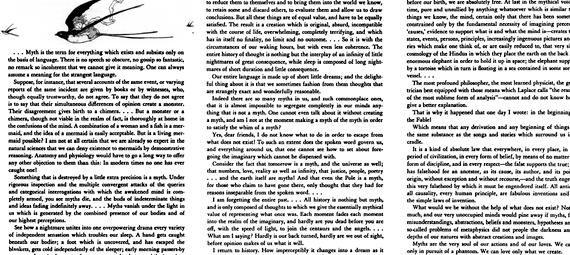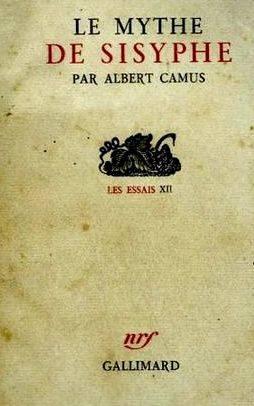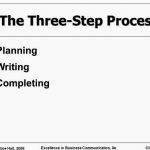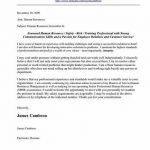Summary
(Critical Survey of Literature for Students)
Regarded as one of the foremost thinkers and writers of modern France, Albert Camus reached maturity at a time when Adolf Hitler came to power. Camus’s writings express the horror of living during Hitler’s rise and during World War II, and the desire to establish a meaningful life in a meaningless world of war and futile conquest. Not content with the nihilism of his age, and unable to ignore the catastrophe of modern life, Camus developed two related concepts, the absurd and revolt, into a significant philosophy of personal life. He examined the concept of revolt at length in The Rebel (1951), but in The Myth of Sisyphus he presents the concept of the absurd and thus outlines the belief that the individual has worth but lives in a world that denies such worth. The absurd is the clash between the order for which the human mind strives and the lack of order that one finds in the world.
Camus begins The Myth of Sisyphus by categorically stating that the one truly serious problem of philosophy is suicide, because suicide is the confession that life is not worth living. Why, he asks, do people not commit suicide? From this springboard he goes on to describe the absurdity of existence. People are not logical in the act of killing themselves, but they do believe in the absurdity of their lives. The absurd, Camus explains, forces itself upon a person when that person desires to find absolutes by which to guide his or her life; a person searches for absolutes but finds that the world is not reasonable. Once one realizes that existence is absurd, two solutions emerge: suicide or recovery. In short, one’s experiences bring the necessity of choosing between suicide and life in absurdity. If one chooses life, then one must accept the absurd. This absurdity is neither in the person (who has an internally consistent understanding) nor in the world (which also is consistent), but is the bond uniting them; therefore, physical suicide does not answer the question of absurdity—such an act merely destroys one of the terms.
Having stated this thesis, Camus then considers the alternatives to physical suicide. Philosophical suicide, the existential “leap of faith,” is an antirational acceptance of the limits of reason. Reason’s limitations are an excuse to transcend to God. Camus calls this attitude an escape; the absurd does not lead to God but only to itself. Hence, to speak of a “leap of faith” is like advocating physical suicide since both are escapes and, therefore, seek to contradict or negate the absurdity of existence. Physical suicide attempts to have value or meaning in a meaningless existence; the existential “leap” tries to evade the condition of life. Rejecting physical and philosophical suicide, Camus reaches the final alternative: A person must fully confront the truth of his or her existence and accept it. Continually tempted to either kill oneself or make a “leap,” a person must live only with the certainty that nothing is certain except the absurd. A person must find whether it is possible to live without appeal. Such a person is indifferent to the future but wants to live the now to its fullest; such.
(The entire section is 1296 words.)
Get Free Access
Start your free trial with eNotes for complete access to this resource and thousands more.
30,000+ Study Guides
Save time with thousands of teacher-approved book and topic summaries.
Get Homework Help
Ask real teachers questions on any subject or search 300,000+ answers.
On the Go Access
Learn from study guides, Homework Help, and quizzes on the eNotes iOS app.
Start your free trial with eNotes to access more than 30,000 study guides. Get help with any book.
The Myth of Sisyphus Homework Help Questions
The central idea of the “Myth of Sisyphus” is the conflict of what Camus called the ‘absurd;’ the conflict occurs between what we want in the universe (enlightenment, order) and what we find in the.
Albert Camus’ essay “The Myth of Sisyphus” uses allusion, analogy, ethical appeal (ethos), juxtaposition, and imagery: Allusion: he obviously alludes to the Greek myth of Sisyphus, as well as.

Related Topics





 Planning writing completing reports and proposals for business
Planning writing completing reports and proposals for business Story writing topics with hints for little alchemy
Story writing topics with hints for little alchemy My uncle jules guy maupassant summary writing
My uncle jules guy maupassant summary writing Writing your salary requirements in a cover
Writing your salary requirements in a cover Tips improve your english writing skills
Tips improve your english writing skills






